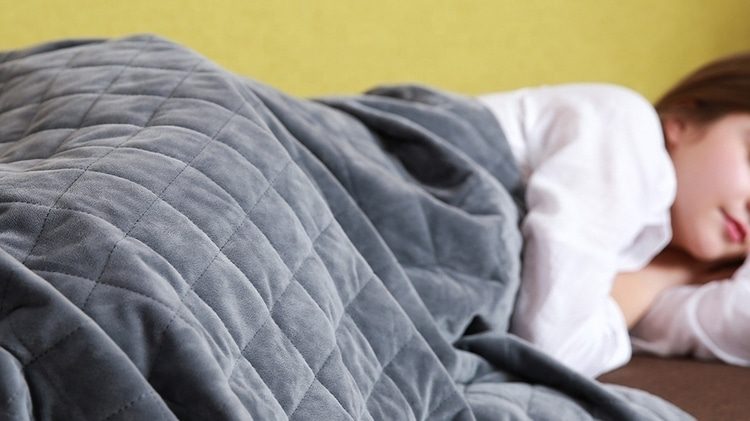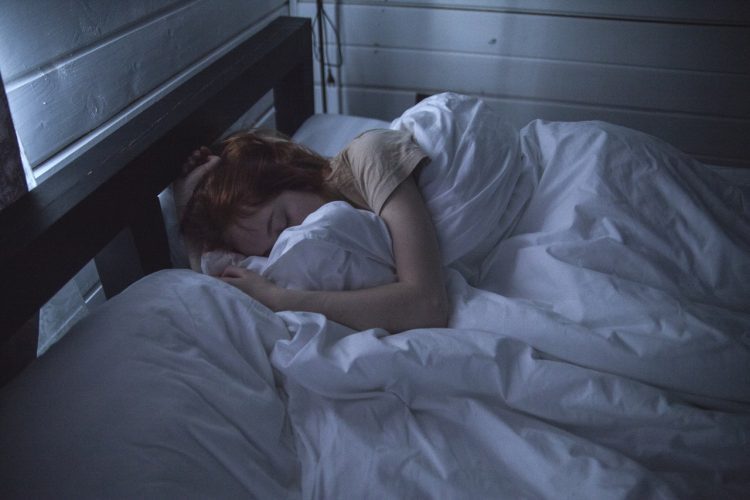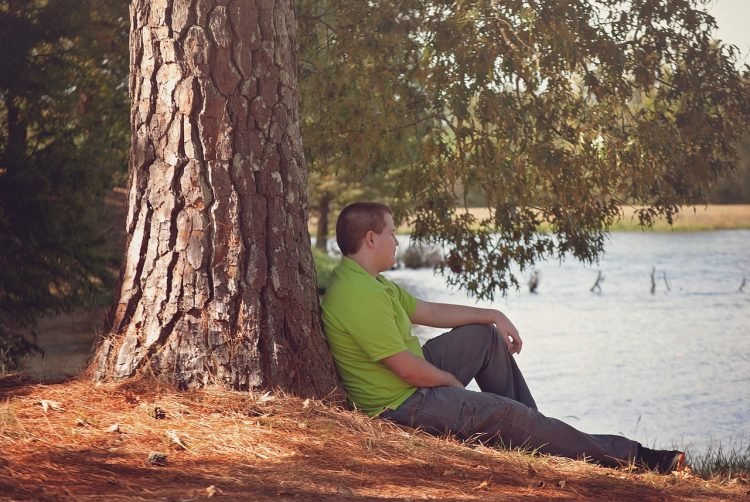Have you heard about the amazing benefits of weighted blankets for calming anxiety, insomnia, and a myriad of other mental health issues? Did you know that a teenager with special needs could sleep better using one?
People of all ages have tried weighted blankets for themselves, and achieved improved sleep, with many remarking on how comforting it felt to fall asleep in one. Parents who have teens with special needs are even turning to this ‘weighted’ option as an alternative to drug-based or therapy treatment.
Weighted blankets could help teenagers with special needs by stimulating their bodies’ deep pressure touch (DPT) receptors to boost Serotonin and Endorphin levels for a ‘calming’ effect that promotes restful sleep.
What makes weighted blankets special?
Weighted blankets put more pressure on the body to help it relax, and de-stress. The weight of the material stimulates the deep pressure touch (DPT) receptors of the body, triggering the release of ‘feel-good’ hormones that helps people fall and stay asleep for longer.
When you first use a weighted blanket, the first thing you’ll notice is the prominent weight of the material. With most weighted blankets weighing at least 5 lbs, they are definitely not your typical sleep blankets.
What’s the science behind weighted blankets?
Studies have shown that naturally produced chemicals Serotonin and Endorphin help us to feel calm and relaxed. When Serotonin is released in the presence of darkness or a comfortable environment, it’s converted into melatonin, the body’s main sleep-inducing hormone.
Weighted blankets help to prevent excessive secretion of cortisol – a stress-response hormone at night-time. Cortisol is usually produced when the body is under duress and is the body’s way of setting up a defense mechanism.
Weighted blankets work by pressing down on the body – commonly known as ‘grounding’. This is particularly beneficial to people with generalized anxiety disorder and insomnia.
As humans, we tend to feel safe and comfortable when swathed. Our affinity for close contact may explain why we feel a sense of ‘security’ and trust toward others when we hug them. Weighted blankets are designed to mimic the pressure you would ordinarily get from a snug fit hug by a real person.
What are weighted blankets made of?
Cotton and polyester are the two most common fabrics used in making weighted blankets. The fabric is usually quilted because it’s meant to hold a substantial amount of weight. (some weighted blankets weigh as much as 25 lbs.)
On the inside of the material are pockets stuffed with small plastic ‘pellets’ that contribute to the overall weight of the blanket. The pellets are stuffed in the same measure across the length and breadth of the blanket to distribute the weight uniformly.

Most weighted blankets are hand-sewn and meticulously crafted by highly skilled workers. The materials used in making weighted blankets are carefully selected for comfort and durability.
Rise in popularity
Weighted blankets have become common items in many homes over the last few years after widespread circulation of the benefits it had for people with special needs. With time, people that didn’t even have special needs came to know how weighted blankets improved sleep and started using them as well!
Many doctors now prescribe weighted blankets for teens with special needs as an alternative or supplement to other traditional methods of treatment. Parents of such teens may be looking to buy blankets that are comfortable, yet heavy enough to alleviate some symptoms over time.
Weighted blankets for teens with sleeping problems
Teenagers with autistic symptoms, anxiety disorders, depression, post-traumatic stress disorder (PTSD), autism spectrum disorder (ASD) etc. tend to have lower levels of sleep-inducing hormones which cause them to have difficulty falling and staying asleep.
Parents who care for teens having these issues may be forced to seek drug or therapy treatment that often runs into thousands of dollars in medical bills if they are not covered by insurance.
Benefits of weighted blankets for autistic teens
One event that no parent is ever fully prepared for is when their kids transition into young adults. The teenage phase usually comes with a lot of challenges, and several adjustments will need to take place to strengthen the relationship between new teens and their parents.
It’s even more challenging for parents who have teens with special needs because, at that age, teenagers will need to develop more independence as they try to forge their own unique identity while dealing with a myriad of new emotions and trying to understand the world around them.
A teenager living with autism may want to be left alone, and could outrightly refuse help from their parents or guardians, even though they need that help more than regular teens. It’s the duty of the parents or guardians to be patient and understanding with them at this point and try to convince them that getting help doesn’t mean losing the autonomy they crave like other normal teens their age.
Autistic teens may have more trouble than their regular counterparts in performing everyday activities. Relaxing, for instance, might be challenging since they typically require more attention and contact. They might often be found restless during the day, especially if they suffer from other mental health conditions in addition to autism.
Weighted blankets could help such teens to feel great comfort even when no one is around them. They can wrap themselves in the blanket whenever they feel insecure or worried.
Adolescents who have a hard time falling and staying asleep due to anxious thoughts may feel more comfortable sleeping with a weighted blanket. Weighted blankets could be an excellent choice for your teenager if they are not claustrophobic, or having issues with regulating body temperature during sleep.
Benefits of weighted blankets for teens with PTSD
Post-traumatic stress disorder is a serious psychiatric condition that could affect teenagers who have gone through a traumatic life experience like losing a loved one, a natural disaster, experiencing terrifying life events and sexual assault.
Teenagers who suffer from PTSD could exhibit withdrawal, anxiety, and fear. At night, they could have nightmares or flashbacks of painful memories during sleep. This could severely impact their ability to have restful sleep.
For teenagers who suffer from PTSD due to sexual assault, hypersensitivity to touch by others is common. These teens may avoid contact with people and have an extreme consciousness of safety at all times.
The first phase of treatment for teens that have experienced sexual trauma will be to rehabilitate their senses of touch. This is critical because they might have a hard time trusting bodily contact, even with loved ones.

Teenagers with PTSD often feel helpless and tend to be withdrawn from social gatherings. They are also likely to suffer depression if the PTSD is left untreated. Weighted blankets are a viable alternative to drugs and therapy that could take a long time to achieve considerable improvement.
Weighted blankets can make teenagers with PTSD feel more secure during sleep – by causing them to feel like they’re not alone or in imminent danger. Also, at any time of the day when they begin to feel overwhelmed with negative emotions, they could simply wrap themselves with their weighted blankets to feel secure.
Many parents and guardians have remarked that their teenagers with PTSD stayed asleep for longer and seemed more relaxed after they started using weighted blankets. The sheer weight of the weighted blankets put just enough pressure on their whole bodies to stimulate a ‘calming effect’ that helps them feel more at ease.
How to you choose the right weighted blanket for your teenager
Assuming you have made the decision to get a weighted blanket for your teenager, the question on your mind will be ‘what do I look out for in a weighted blanket before buying?’
Weight
The most important factor to consider before choosing a weighted blanket is the weight of the blanket. Usually, weighted blankets are prescribed for people based on their own body weight.
A rule of thumb to follow when selecting a weighted blanket is that it should be at least 10% of their body weight with 1 – 2 lbs. added to account for weight loss or gain over the useful life of the blanket. For example, if the teenager weighs 60 lbs, weighted blankets ranging from 6 lb. to 8lb. would be ideal.
Material
Another important factor to consider is the material used for making the weighted blanket. As mentioned earlier, the two main fabric choices are cotton and polyester. The choice of material you go for should depend on your teenager’s preference.
It’s a good idea to choose a weighted blanket that is suitable for the climate of your country. While cotton is more breathable and easier to fold when not in use, polyester is more pliable and tends to generate more heat underneath.
Some teenagers would appreciate the sensation of a soft, plush fabric on the skin. It’s important that you select a material that is breathable; If your teen is a clumsy sleeper that often goes under the covers while sleeping they shouldn’t find themselves running out of air under the blanket.
Last Words
It’s important that parents allow their autistic teens to warm up to the idea of using the blankets at their own pace. Weighted blankets could feel uncomfortable for some teenagers at first; especially those who are claustrophobic, or have difficulty regulating their body temperature as weighted blankets could induce a considerable amount of warmth. Choose a cotton cover if warmth is going to be an issue to improve its breathability.

